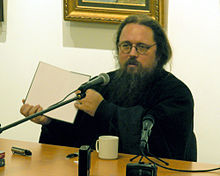Updated Daily. This week’s issue:
– Doctors Protest Hospital Closures and Pay Cuts in Health System ‘Reforms’
– The Value of the Ruble is Falling, Along with the Price of Oil
– Russian Censorship Agency Strikes Ekho Moskvy News Site, Removes Article on Donetsk Airport
– Russian Reporter Publishes List of ‘Most Authoritative Russians’ – from Human Rights Heroes to Victimizers
– Russian Actor with ‘Press’ Identifier Filmed Shooting at Donetsk Airport
– France Denies It Agreed to Ship Mistral to Russia; Bulava Nuclear Test Missile Launches
– Chechen Political Exilee Abducted, Tortured by Russian Agents in Strasbourg: Time
– Memorial Activists Recall Victims of Communist Regime — and Count Today’s Political Prisoners
– Kremlin Spokesman Refutes Rumors of Putin’s Ill Health
– Putin’s Ratings Decline for First Time This Year
– Two Russian Mercenaries Sentenced For Fighting For Assad In Syria
– Anti-War Intelligentsia Protest TV Hatred Against Ukraine; Activists Launch Anti-Fascist Video Campaign
– Russian Nationalists Granted Permit to March in Moscow Suburb
– TV Rain Selects Most-Discussed Quotations from Putin’s Speech
– At Valdai, Putin Lauded by Sycophants and ‘Realists’
– Russian Soldiers Still in Ukraine; Kremlin Announces Compensation for Missing and Killed Servicemen
– Former Lenta.ru Editor Launches Medusa in Riga; TV Rain Evicted in Moscow
– Putin’s Neo-Imperialism and the Price of Oil
– Soldiers’ Mothers Activist Arrested, Had Pressed Cases of Russian Soldiers in Killed in Ukraine
– Gorbachev Confirms There Was No NATO ‘Non-Expansion’ Pledge
– Poland Arrests Russian Lt. Colonel and Lawyer on Suspicion of ‘Espionage’
– Two American Journalism Professors Detained in St. Petersburg at Workshop
– Harassment Continues of Pskov Legislator Who Investigated Soldiers’ Deaths
– Russian Liberals Criticize Navalny’s Interview on Crimea, Putin
– Ekho Moskvy Interview with Navalny: ‘We Have to Stop Sponsoring the War’
– Members of Presidential Human Rights Council Raise ‘Information War’ Against Ukraine, Crimean Tatar Disappearances with Putin
– Sakharov Center in Moscow Attacked During LGBT Meeting
– Poitras Made No New Interviews with Snowden for ‘Citizenfour’; He Refused Her in Moscow
– Hundreds of Russians Poisoned, 25 Dead in ‘Spice’ Drug Epidemic
Please help The Interpreter to continue providing this valuable information service by making a donation towards our costsâ€.
Doctors are rallying today 2 November in Moscow to protest recent government decisions to close hospitals, cut staff and reduce pay of medical personnel in the name of reforms.
They’re demanding a halt to reforms they say are destroying the health care system and calling for the resignation of Vice Mayor Leonid Pechatnikov, who is responsible for social issues.
By next year, the expenditures of the health care system are to be slashed by nearly 29%.
The livecast can be seen here:
Translation: in Moscow a protest rally of doctors has begun – we are running a liveblog.
Posters: Doctors to Become Orderlies? Bureaucrats Should Become Janitors!
Closed a Hospital? Open a Graveyard!
Translation: Livecast of doctors’ rally on the air at TV Rain.
Translation: The largest rally of doctors in 15 years is taking place in Moscow. The most exact poster is in the photo [Money for medicine, not war].

Roskomnadzor, the state censorship agency, has struck again, this time against the independent radio station and news site Ekho Moskvy for an interview on the battle for the Donetsk Airport.
The airport has been reduced to rubble as Russian-backed separatist fighters continue to storm it.
The censor’s action is leaving people puzzled because they can’t tell what is “wrong” with the piece, and why authorities would claim that it supposedly constitutes the sanctioning of war crimes.
The page where the article used to be is now blank with an indication of the authors and a notice “The transcript has been removed at the request of Roskomnadzor.”
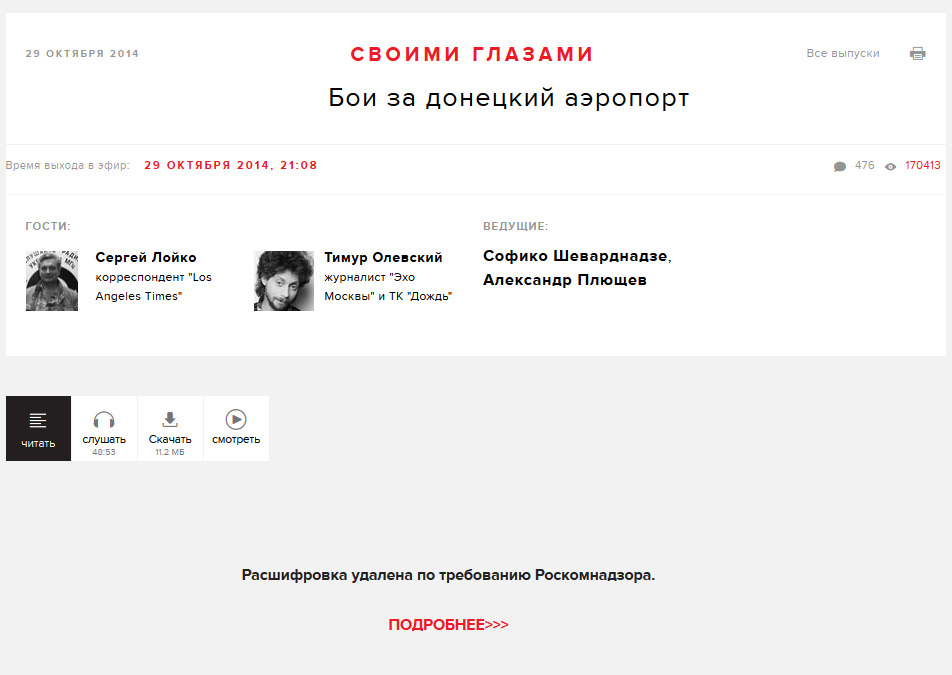
The notice then links to another page with the official notice from the Ministry of Communications and Mass Media, to which Roskomnadzor, which is the acronym for “Russian Committee for Monitoring” is subordinate.
The notice explains that the article may fall under Russian law banning “extremism,” which means aside from an act of censorship, the notice is an official warning of prosecution. If a media outlet gets more than two warnings within a year-long period, it could face closure. This is the first warning of this nature that Ekho Moskvy has received since it began broadcasting in 1990.
The notice is signed by Mikhail Ksenzov, the deputy director of Roskomnadzor, who is the same official who has been involved in censoring other independent publications and also threatening the blocking of Twitter.
TV Rain, the independent TV station, contacted Vadim Ampelonsky, press officer for Roskomnadzor, who could not specify what his agency’s exact claims were against Ekho. He said the agency’s lawyers examined the content and decided that the interview contained “the justification of war crimes.” He refused to say more, disingenuously noting, “As the case has the prospect of going to court, any public statements by officials may have an undesirable judicial consequence.”
TV Rain has its own problems with censors — and spent its last day in
its studios at the Red October building today after an early eviction
notice from owner Aleksandr Mamut. It is not clear where the station will be broadcasting from next.
Translation: We bid farewell from the live studio right now. Turn on TV Rain.
Ekho Moskvy aired the discussion of the Donetsk Airport battle on its Svoimi Glazami (“Eyewitness”) program. Participants included Sergei Loyko, who published a stark portrait of the Donetsk Airport in the Los Angeles Times, as well as Timur Olevsky of TV Rain and Sofiko Shevardnadze and Aleksandr Plyushev of Ekho Moskvy.
Possibly the Russian ministry found that any portrayal of the
Ukrainian defense of the airport could be suspect. Russian leaders and
state TV have repeatedly accused the Ukrianian military of shelling
civilians.
If anything, the war crimes at the Donetsk Airport involve the
Russian-backed separatists, who have occupied residential buildings nearby with
people still living in them to shoot at Ukrainian positions at the
airport, drawing return fire.
Oleg Kashin, the Russian blogger who now lives abroad after suffering a brutal attack for his writings some years ago, placed the whole transcript on his website at kashin.guru.
Russkiy Reporter (Russian Reporter) has published a list of the “100 most authoritative people in modern Russia.”
Russkiy Reporter (RR), a publication of the Expert Group that generally hews to a pro-government line, has included news-makers as well as moral authorities who range from Chechen strongman Ramzan Kadyrov, notorious for his autocratic regime and punitive policies, to Tanya Lokshina, the Russian Human Rights Watch researcher who reports on human rights violations in Chechnya.
Perhaps the intention is to “humanize” them, but the effect is chilling.
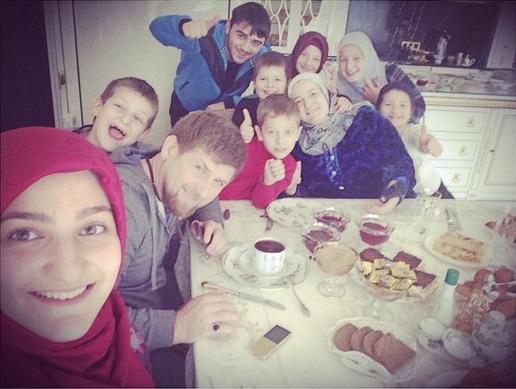
Kadyrov having tea with his relatives 26 October 2014.
The list has sparked a lot of debate on social media and RR tries to pre-empt some of this by acknowledging that their scope is wide, but their criteria for selection involved determining people who “committed a strong deed in the last year” — for good or evil.
The first thing that strikes the eye about this list is that Vladimir Putin is not on it. In a world in which recently his top Kremlin aides reverently intoned, “There can be no Russia without Putin” at the Valdai International Discussion Club, and where Putin was voted “the greatest moral authority,” it’s interesting that he doesn’t show up on this list. Evidently the reporters are not afraid.
In fact, Putin is only mentioned in passing in describing some of the other people on the list, such as Ilya Pinigin, an environmental activist who has battled illegal fences, and is famous for breaking down the fence to Putin’s dacha at the exclusive Ozero Cooperative.
And he’s mentioned in the description of Svetlana Gannushkina, a dedicated human rights advocate nominated for the Nobel Prize in the past, who helps migrant laborers and refugees. On the wall in her office are thank-you letters from Putin, Prime Minister Dmitry Medvedev and Mayor Yuri Luzhkov for her service in the Presidential Council on Human Rights.
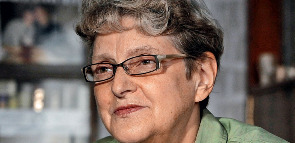
There are other civic heroes on the list such as Ilya Ponomarev, the lone parliamentarian who voted against the forcible annexation of the Crimea in the State Duma, and who has campaigned for the release of the political prisoners arrested in the Bolotnaya Square anti-Putin demonstrations and taken on other liberal causes — to the point that now he has left Russia after being targeted with threats and prosecution.
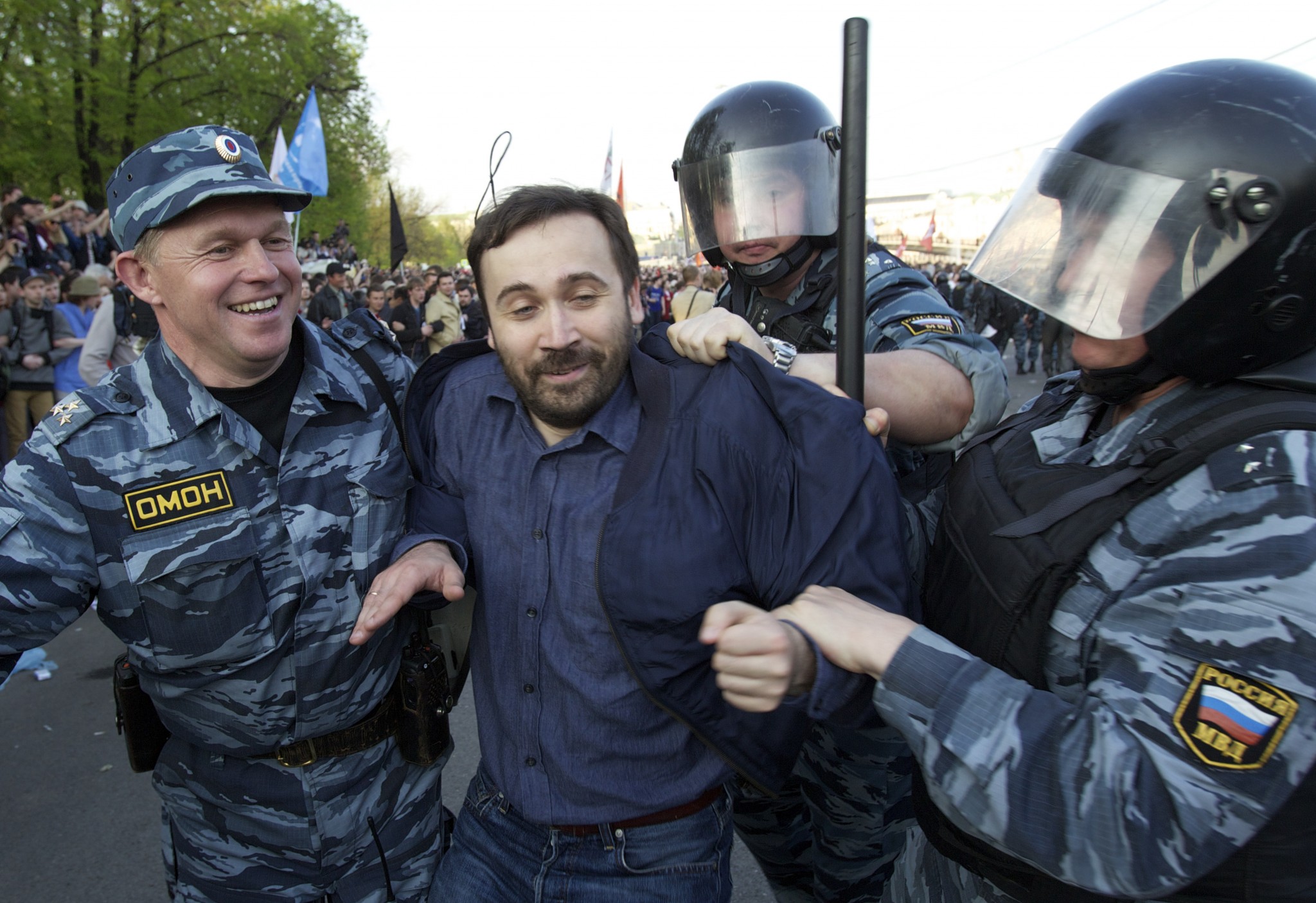
Ilya Ponomarev, arrested by riot police at a demonstration.
There is Lev Shlosberg, the Pskov region legislator who blew the whistle on the Pskov 76th Regiment soldiers sent clandestinely to Ukraine — some of whom were killed in action. He was attacked by thugs that left him in the hospital with severe injuries, but he has kept up his effort to expose what happened to Russian soldiers.
Genri Reznik, a prominent lawyer who picketed NTV for their hateful broadcasts on “friends of the junta” is included — in other words, principled liberal Russians who protested the war in Ukraine like Andrei Makarevich, the famous rock musician, who is also on the list.
Maj.-Gen. Sergei Bobrov, the former head of the Investigative Committee in Chechnya who was forced into retirement, is included because he tried to bring to trial Chechen police responsible for the kidnapping and murder of innocent civilians.
But as even RR would concede, the good of including Bobrov and others like him is undone by including Ramzan Kadyrov, who presides over the system that enabled the kidnappings and murders in the first place and forced Bobrov to leave.
So you get the feeling that Russkiy Reporter, while including such persons who have indeed performed brave civic acts, is not only sticking to what is “safe” but trying to ensure “balance” so that no one will think they are “biased.”

Cover of Russkiy Reporter, with stories about finding meaning the meaning of life in a village in the Cossack steppes, “Sochi is Good” and WikiLeaks.
“Balance” doesn’t mean equating human rights activists as well as violators, however; it means telling the truth about Russia, which is that there are more of the latter than the former.
Perhaps what’s being more discussed is who is left out of the list, not who is included.
Aleksey Navalny, the anti-corruption campaigner and political opposition leader who got 30% in the mayoral elections — isn’t in the list. Navalny is under house arrest related to various cases fabricated in retaliation for his opposition activity. RR left him out not because they’re concerned about his nationalism tendencies or recent controversial statements saying he would not give back the Crimea.
RR was happy to include Mikhail Khodorkovsky, the former YUKOS owner pardoned from his political imprisonment by Putin earlier this year who has also been forced to live abroad. Khodorkovsky also took the position that he would keep Crimea if he were president. (Note: The Interpreter is funded by the non-profit Institute for Modern Russia, run by Khodorkovsky’s son.)
And obviously RR included Aleksey Chaly, the “people’s governor” of Sevastopol and even chose his picture for the top of the article and featured him first — and obviously he’s the No. 1 fan for the Crimean Anschluss.
Chaly — who shocked Western observers by appearing at Putin’s triumphant ceremony in the St. George Hall without a tie, in a black sweater — is made to seem almost cuddly. This self-declared ruler who presided over Russia’s forceful takeover of Sevastopol says that the reason he wasn’t in a suit and tie is because agents of Moscow came suddenly to pick him up. They didn’t tell him where they were going as it was a secret, and he didn’t find out that he was to star in a ceremony with Putin until he got to the Kremlin. So who is the mafia here?
 Chaly, right, with Putin, center.
Chaly, right, with Putin, center.
RR implies Chaly’s sweater is an emblem of modesty and even poverty, describing his beat-up office without a secretary or a plaque on the door, overflowing with petitioners by saying “you cannot look at it without tears.”
No, there’s no Navalny — nor Boris Nemtsov, another opposition leader who exposed the outrageous $50 billion corruption of the Sochi Games, or Ludmila Alexeyeva, head of the Moscow Helsinki Group, also vilified on NTV, who has persisted with her criticism of prison conditions and police abuse, or Yevgeniya Albats, editor of the critical Novoye Vremya or Arseny Roginsky, Alexander Cherkassov, Oleg Orlov and other Memorial Human Rights Center leaders who have reported as critically on Russian forces’ abuses in the North Caucasus as they have on Ukrainian military in the Donbass. Now Memorial’s Human Rights Center has been declared a “foreign agent” and order to submit to further government scrutiny, and Russian Memorial, the national organization has been targeted for liquidation.

Arseny Roginsky
All of these individuals and many more commit brave civic acts every day, but they don’t “fit” for RR because they constitute a greater challenge to the regime — which is why some of them are under investigation or their organizations have been targeted for “liquidation” by the Ministry of Justice.
This is a “nice” list that makes you think the free press might still be alive in Russia. But it includes Galina Timchenko, former editor of Lenta.ru, who was also forced abroad to start a new media operation, Meduza — in Latvia. RR tells us that she “didn’t allow the owner to interfere in editorial and personnel policy but quit the post of editor-in-chief. A large part of the editorial collective followed her.” But it doesn’t tell us where they went — to Riga.
Pavel Durov — the social media entrepreneur who fled Russia when he refused to turn over customer data to Russia’ intelligence agencies — is also in the list. Here it is mentioned that it was EuroMaidan’s data that the FSB wanted, and RR does say Durov left Russia, but doesn’t mention his new projects like a program for mobile phone encryption — which exist because of Russian state surveillance.
It’s great that even a generally pro-Kremlin and “safe” publication still feels bold enough to acknowledge the work of people like Ilya Azar, the former Lenta.ru reporter who covered EuroMaidan faithfully and truly.
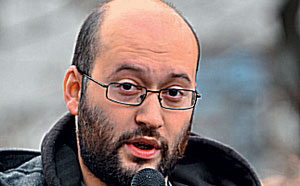
Or other brave war correspondents like Andrei Babitsky or veteran liberals like Danil Granin or the academic Andrei Zubov, fired for his criticism of the war on Ukraine or Deacon Andrei Kurayev who exposed child abuse in the Kazan Seminary and was dismissed from the Moscow Theological Academy.
Andrei Kurayev
But Foreign Minister Sergei Lavrov, Putin’s face to the world and chief justifier of the Russian assistance to Syria, who escaped Western sanctions only because he is Foreign Minister and still needs to travel to the West for negotiations; Anatoly Kucherena, the lawyer for fugitive former NSA contractor Edward Snowden who is not referenced here as sitting on the FSB’s civic council; Dmitry Rogozin, the hardline deputy prime minister for the defense industry who is always doing Russia’s saber-rattling on Twitter — these are not civic heroes who have performed civic deeds, or any deeds outside their routine job descriptions.
Dmitry Rogozin
They defend the autocratic and violent Russian state responsible for undoing most of the good of the few underdogs that RR is willing to admire, Russian-style (Russians love to be most sentimental about people who are clearly Don Quixotes losing at their cause.) They can’t even really be described as performing any type of deed — what was Peskov’s deed, for example?
And outright executioners like Col. Igor Strelkov of the “Donetsk People’s Republic” who resurrected a Stalin-era law to sign death warrants for people in Slavyansk; Arseny Pavlov, better known as “Motorola,” the commander of a battalion in the “Donetsk People’s Republic” who marches through civilian areas shooting with impunity — they are in the list, too. And that lets us know what this is really all about: not just recognizing that some people, even if they do evil, are relevant news-makers and have to be acknowledged as such — but about the cause of Putin’s “Russian World.”
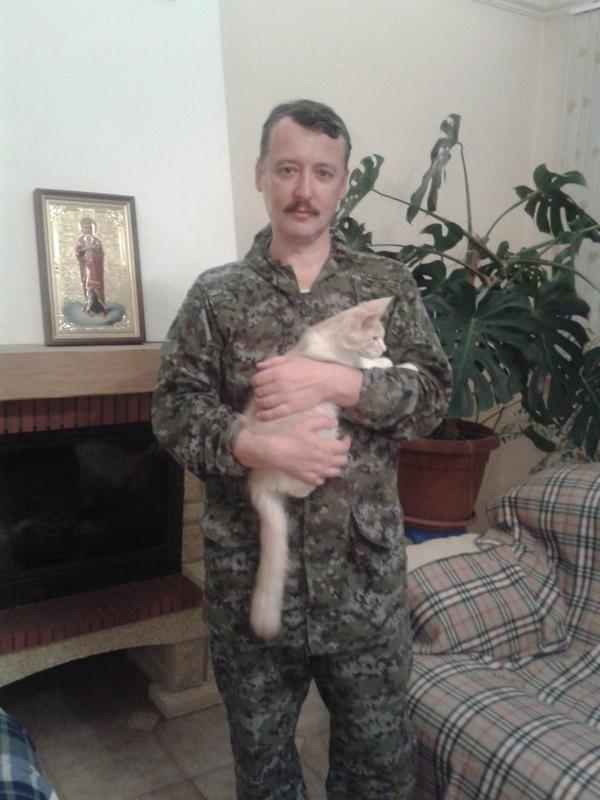
Col. Igor Strelkov (Girkin), former commander of “DPR militia.”
That’s why RR didn’t call this the “newsmakers’ list” like chosing the “Time Person of the Year” but stressed that deeds were involved — mainly civic deeds — and that they are “the most authoritative” — they are role models.
Conservative Russian nationalist Vitaly Milonov wants to ban Tim Cook, the CEO of Apple, from entering Russia.
Milonov, a deputy of the St. Petersburg legislature, opposes gay rights in general.
In a statement published in Business Week, Tim Cook announced today October 30 that while he valued his privacy, he wanted to acknowledge his sexuality. He declared he was proud to be gay.
Soon “Tim Cook” was a trending term on Russian-language Twitter.
Meanwhile, Milinov told the Russian news agency FlashNord (translation by The Interpreter):
What can he bring here? The Ebola virus, AIDS, gonorrhea? They all have indecent relations over there. We should ban his entry permanently. He’s increasing sales this way. Apple became a popular brand. He is like an artist who at first builds himself up as an artist and then announces that he is a pederast. Now everyone knows that Apple is made by pederast and everyone begins to change their consciousness — but he’s talented…It’s a subtle political move.
Milonov himself has been shown using an Apple tablet so a picture of him with the Apple logo colored in the gay pride rainbow colors is making the rounds of social media.
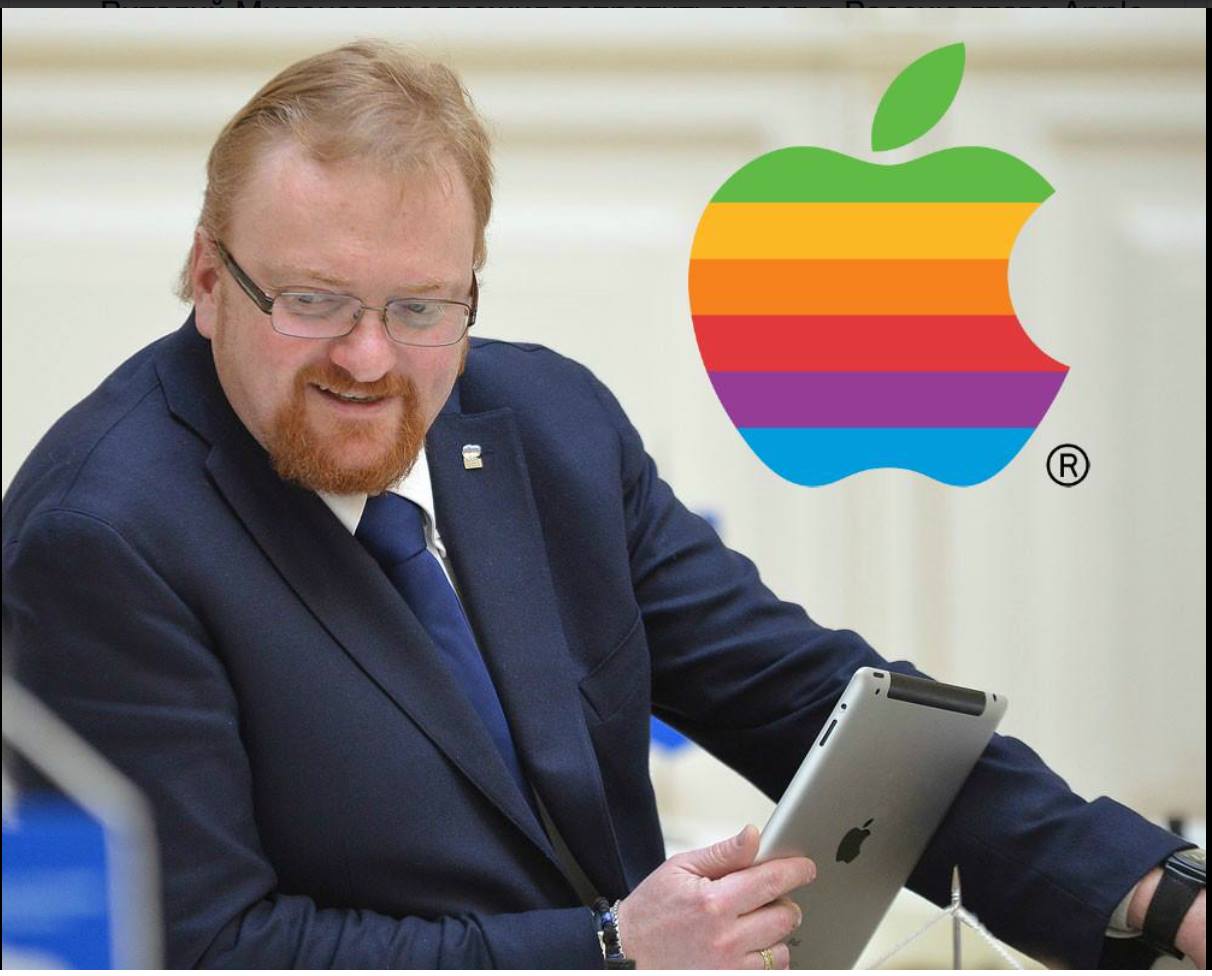
A famous Russian actor named Mikhail Porechenkov took up a machine gun in Donetsk and shot live ammunition at the Ukrainian army defending the Donetsk Airport — all while wearing a helmet with the word ‘PRESS’ stenciled on it. The incident created a furor, with Ukrainian authorities opening up a criminal case against him, and even Pavel Gusev, head of the Russian Journalists’ Union expressing fury over the misuse of press insignia.
How could this happen?
To understand the background, it’s important to see the symbolism of the Donetsk Airport in this war — where each side is fighting for it to the death. The airport is the only part of the strategically-located city of Donetsk which is controlled by Ukrainian forces — and it is an important facility into which hundreds of millions of dollars were sunk in a reconstruction in 2012.
Practically every day, either Russian state television or various
media outlets serving the Russian-backed separatists broadcast or upload footage of the fighting at the Donetsk
Airport. It’s gotten to be a kind of sick genre.
The Airport is in ruins now, with hardly any buildings that aren’t
already in rubble left to shoot. But the “Cyborgs” — as the determined
Ukrainian soldiers call themselves who are still defending the landing
strip — are still in position.
The Donetsk Airport has now become a backdrop for a kind of
separatist theater — new recruits are brought there to learn how to
shoot, militants try out new weapons — supplied from Russia —
there, and various commanders try to become famous. This is why the actor Mikhal Porechenkov felt he had to make a stop there — and show off for the cameras.
The airport has become a kind of “baptism by fire” location for the war.
The blogger @dpj3tros at Ukraine@War found some of the videos with new recruits who are brought in to be trained — some of whom have been killed in action as we learn during the videos.
In this video, a separatist fighter is being instructed how to shoot a thermobaric warhead:
There are many dozens of “Donetsk Airport” videos on YouTube now featuring various scenes from the separatists and their supporters, and they have hundreds of thousands of viewers. Recently, the Ukrainians began to compete with their own “Donetsk Airport” videos.
But with the Russian state’s considerable propaganda machine, the “Novorossiya” videos are more often seen on state broadcasting as well as social media.
The dramatic possibilities for urban warfare have not been lost on the “Novorossiya” script-writers and producers — they have filmed everything from live tank runs on the airport — complete with T-72 tanks which could only have been supplied by Russia…
…to crowd-pleasing interviews with a 17-year-old girl nick-named “Ryzhik”
(“little red-head”) who joined the militants and worked as a cook, then
married one of the commanders and is now shooting alongside the men…
… to buddy-movie type scenarios where “Givi,” the commander of
“Somalia Battalion” and “Motorola,” the fighter who is famous for getting
married with a broken arm, both sit and cuss at the Ukrainians in mat, the Russian swear language where every other word is an elaborate variation of “f**k.”
Graham Philips, the British freelancer who works for Russian state video company Ruptly, is one of the greatest contributors to the “Airport” genre — with English-language subtitles, even. (As we said, there’s evidently a big budget for these videos.)
Inevitably, these videos tell us more about these fighters than they
may have realized — there are numerous scenes where they are taking
over civilian buildings where people are still living in or walking in,
and they waste an enormous amount of ammunition heedlessly, and keep
getting fresh supplies. Often they show fighters who are soldiers who
make no secret of the fact that they are from various parts of Russia —
Chechnya, Southern Ossetia, or Rostov.
Their intimate cooperation with Russian state media, which either
films them in action or uses their own videos in broadcasts, is also on
display as we have reported.
And that’s how we came to the show staged today by “Novorossiya TV” which uploaded a video to YouTube showing Porechenkov shooting the mounted machine gun at the Ukrainian position at the Donetsk Airport.
Porechenkov is known for his war action films like D-Day, the
Russian remake of the American film Commando. In the video, he gives an
emotional speech in support of the
“Novorossiya” fighters, conveying the support of the “folks back home.”
Asked about how the Chechen war, which he experienced, differed from
the war in Ukraine, he said it was “horrible” in the same way — but
different.
Then he and his hosts laugh at the idea of any “cease fire” and he starts shooting at the airport:
What’s troubling about the scene is that Porochenkov is dressed in
the protective clothing issued to Russian journalists — the same
bullet-proof flack jacket and helmet with the word “PRESS” stenciled on
the back.

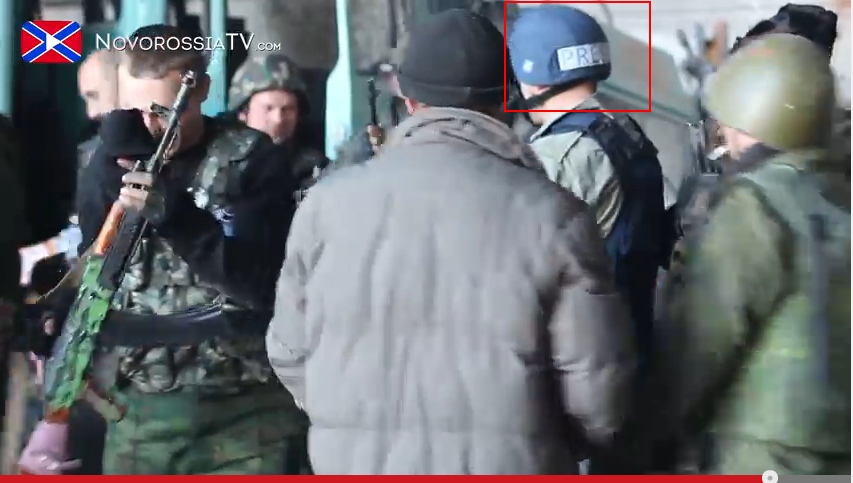
In a statement on its Facebook page, the Ukrainian Security Service (SBU) announced it has opened a criminal case against Porechenkov under Art. 258-3 (“participation in terrorist activities”) with the self-proclaimed “Donetsk People’s Republic”.
Of course this is not the first time we’ve seen the distinction blurred between journalist and soldier.
What Philips means by “give me form” is “give me a uniform”; forma is the Russia word for uniform.
Here Philips hunkers down with a member of the Vostok Battalion and learns to fire a weapon:
Yesterday October 29, there was a flurry of concern when Dmitry Rogozin, the hardline Russian deputy prime minister in charge of the defense industry tweeted an invitation to a hand-over of the French Mistral to Russia.
France had agreed to postpone the Mistral, amid protests from shipyard workers, due to Russia’s war on Ukraine and in light of Western sanctions.
Translation: Rosoboroneksport [State Arms Export Agency] received a invitation for 14 November for the handover of the first Mistral and launching of the second ship.
As our analyst Andrew Bowen wrote back on September 25:
It now seems clear that Sevastopol will become the newest home for a
French Mistral assault ship, Vladivostok, and while temporarily paused,
the winning wager is probably that the sale will eventually go through. The Mistral will join some 80 new vessels by 2020 according to the head of the BSF, Admiral Alexander Vitko, and will total some 206 ships.
The Russian state news agency RIA Novosti at first confirmed the invitation.
Then it turned out the launch video was from the archives, and RT made one of its rare apologies:
And the invitation from Rosoboroneksport went out before France had said it wasn’t decided:
Then it was time to walk the story back:
So — no Mistrals for now for Russia.
And just a video from the inside of the Russian submarine as the nuclear missile was launched.
intercontinental ballistic missile from the Barents Sea towards the Kura
testing range in Kamchatka, the press service of the Russian Defense
Ministry told TASS yesterday.
Time‘s Moscow correspondent Simon Shuster has published an alarming story, Putin’s Secret Agents, about Said-Emin Ibrahimov a Chechen political asylee who was kidnapped and tortured by Russian intelligence agents — just as used to be done during the Cold War.
Ibrahimov had fled Russia in 2001 and settled in Strasbourg, where he thought he would be safe. He spent some years compiling documentation of war crimes by Russian military in his homeland, the Chechen Republic, and submitted it to the International Criminal Court in August. He then went on a fishing trip.
Shuster writes:
Ibragimov had reason to be nervous. The previous month he had accused Russian President Vladimir Putin of war crimes in a criminal complaint he had sent to the International Criminal Court (ICC) and to the Kremlin. Ibragimov had taken five years to compile evidence of what he considered crimes committed during Russia’s two wars against separatists in the Russian republic of Chechnya. During the second Chechen war, which Putin oversaw in 1999–2000, Russia bombarded the Chechen capital of Grozny and killed thousands of civilians. The U.N. later called Grozny “the most destroyed city on earth.”
While he was sitting on the banks of the Ill, strangers came up and clubbed him over the head, knocking him unconscious.
When he awoke, he tells TIME, he found himself blindfolded and in the custody of at least three men, all of them speaking Russian. Calmly at first, they urged him to stop “defaming their President,” but when Ibragimov told them in response that he “does not take orders from thugs,” the men began to beat and torture him, he says. The abuse continued over the course of nearly two days.
Ibragimov says the men spoke Russian with no accents—“like Muscovites,” he recalls, “definitely not Chechens.” He does not know who the men were, but from their accents, their words and their actions, he believes them to have been agents of the Russian government.
In his Valdai International Discussion Club speech, Putin condemned what he claimed was a Western program to “invade” the Caucasus and Central Asia with extremists and to “support terrorists.”
From pro-Kremlin web sites on the subject and state media, we know he means Chechen exiles from the first freely elected government of Aslan Maskhadov, which was pronounced by the OSCE as free and fair and recognized by Western countries.
Russian officials have characterized the civilian officials from this government as “terrorists,” accused them falsely of ties continued to Shamil Basayev, the Chechen terrorist who committed the atrocity of the Beslan massacre, although these officials, like Ibragimov, fled long before the tragedy in Beslan in 2004, and other terrorist attacks.
The Russian government has condemned any Chechen organization abroad as sponsoring terrorism, even if involved in non-violent activities such as culture or human rights. Unable to convince Western law-enforcement to apprehend and return these people, the Kremlin has resorted to kidnapping and even assassination, such as in the case of Umar Ismailov, another Chechen who compiled and filed human rights cases to the Hague.
TV Rain has done a broadcast based on Shuster’s story in Russian, and also interviewed Ibragimov.
When Russia was accepted into the Council of Europe in 1998, it was with the caveat that it undertake a number of democratic reforms and investigate and try massacres of Chechen villagers that had been documented by Memorial Society, Human Rights Watch and people like Igrahimov.
It did not do so. It took finally the invasion of Ukraine and the reaction of the European parliamentarians to finally suspend Russia from the Council over the forcible annexation of Ukraine throughout 2014.
Today October 30 is the annual Political Prisoner’s Day in Russia.
Activists from Memorial Society, a group devoted to exposing the
crimes of Stalin and other communist leaders and preventing their
recurrence, met yesterday October 29 to begin reading out the names of
the victims in a ceremony called “Return of the Names” at the Solovki
Stone.They went for 10 hours but did not finish — there are tens of
millions of such names.
The numbers of those estimated
to have been executed or who died from forced labor under the Soviet communist
regime ranges from 20 million (Robert Conquest) to 35 million (Soviet
Politburo member Aleksandr Yakovlev) to 50 million (Norman Davies) as
many as 62 million “unnatural deaths” (Russian historian Joseph
Dyadkin).
The range is so wide not only due to debates about how to count
people but because investigation of the communists’ crimes against humanity is still discouraged and blocked, and such research is now again grounds
for political harassment by the Kremlin.
This year’s reading seemed more poignant because Memorial Society itself is now in danger. The Memorial Human Rights Center has been declared a “foreign agent” by the government and is subjected to more scrutiny. Russian Memorial Society, the national organization, has been targeted for liquidation by the Ministry of Justice on the grounds that it has not centrally controlled its chapters in other cities. The St. Petersburg Memorial Anti-Discrimination Center was closed, and the original Perm 36 Museum leadership, displaying exhibitions from the GULAG and the stories of political prisoners, was displaced by officials from the Culture Ministry.
Meanwhile, the sites of the GULAG — the network of prisons, labor
camps and psychiatric hospitals — are disappearing, and the fate of the independent Perm 36 Museum is emblematic.
The generation that survived Stalin’s terror is nearly gone, and even
those who experienced the labor camps of Leonid Brezhnev or Yuri
Andropov in the 1970s and 1980s are dying out. Mikhail Gorbachev, the
last Soviet leader, freed hundreds of political prisoners, and Boris
Yeltsin released the last of them, providing compensation to those who
had been wrongfully imprisoned.
But now Vladimir Putin has returned the institution of political
imprisonment, including psychiatric incarceration. Memorial Human Rights
Center keeps a list currently numbering 46 people. They include
the defendants in the Bolotnaya Square case of anti-Putin demonstrators
arrested in May 2011, and figures like Nadezhda Savchenko, the
Ukrainian pilot apprehended by Russian police and currently in
psychiatric confinement at the Serbsky Institute for Forensic Medicine –
the same facility where Soviet dissidents were kept.
The rock placed in Lyubanka Square, site of the KGB’s headquarters
and still used today by its successor, the Federal Security Service (FSB) was brought
from the Solovki Monastery, which was turned into a prison labor camp by
Vladimir Lenin by decree in 1923. Solovki was made infamous by the writings of Anton Chekhov and Alexander
Solzhenitsyn and the tens of thousands of political prisoners who passed
through it.
A Soviet newsreel from 1927 shows the prisoners felling trees.
Political Prisoner’s Day was started in 1974 by Russian astrophysicist Kronid Lyubarsky, who was imprisoned for publishing the independent samizdat (self-published) Chronicle of Current Events.
Although coincidentally this day has come to be a day remembering
the dead similar to the Christian All Saints Day (November 1), All
Souls’ Day (November 2) or Dzyady, the pre-Christian
commemoration of the dead celebrated in Belarus in late October, in fact
the original date was the date of Lyubarsky’s trial, when he was
sentenced to 5 years of labor camp for “anti-Soviet agitation and
propaganda.”
Lyubarsky went into exile after release from prison and lived in Berlin for many years, issuing a List of Political Prisoners in the USSR, updated annually, containing thousands of names, along with a bi-weekly News from the USSR.
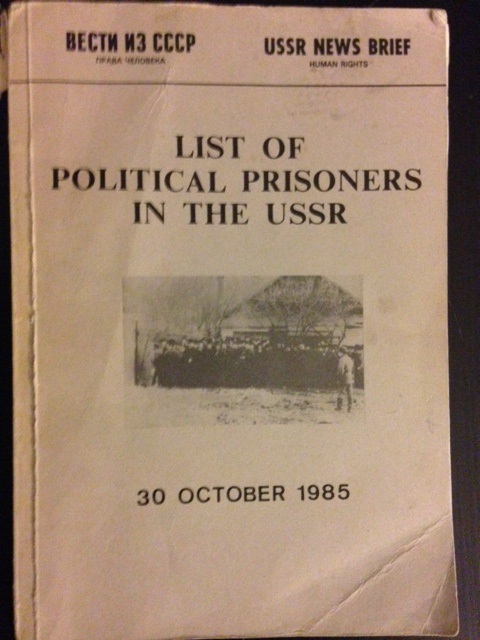
He returned in the 1990s to lead the Moscow Helsinki Group, and
also help draft parts of the new Russian Constitution. He also served on
the editorial staff of a number of magazines, including the Russian Civil Rights Bulletin and joined the magazine Novoye Vremya (The New Times), where he served as first deputy editor in chief, until his death in 1996.
Yevgeniya Albats, the editor-in-chief of Novoye Vremya, was present at the Solovki Stone to read the names of some victims and that of her own great uncle who perished in the GULAG:
Mark Mikhailovich Albats, born 30 October 1899 in Toroptsa,
Jew, candidate to the All-Union Communist Party (Bolsheviks), head of
the design bureau of the Dzerzhinsky Department of ElectrificationAddress: ul. Pokrovka, d. 11, kv. 14
Executed November 1, 1937 according to Stalin’s list of 21
October 1937. Execution list signed by: Stalin, Molotov, Voroshilov,
Mikoyan.Place of burial: Donskoye.
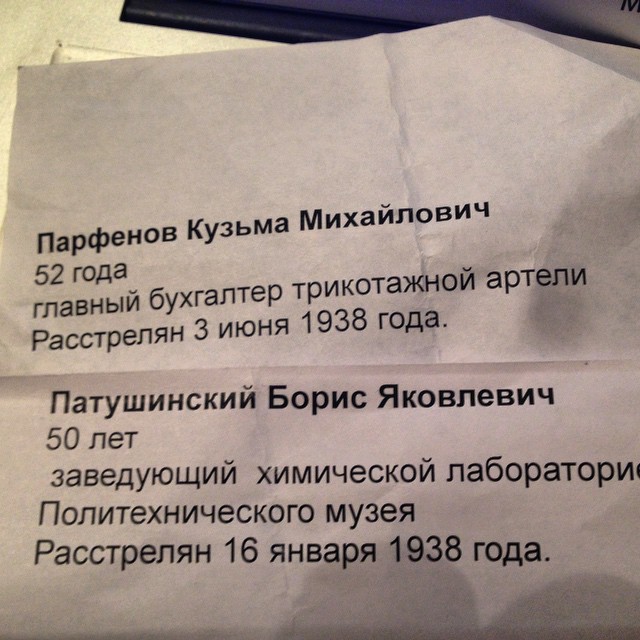
The other victims which she was randomly given to read out:
Kuz’ma Mukhailovich Parfyonov, age 52, chief bookkeeper of a knitware workshop. Executed 3 June 1938.
Boris Yakovlevich Patushinsky, age 50. Director of a chemical laboratory at the Polytechnical Museum. Executed 16 January 1938.
Albats published in Novoye Vremya today documents showing typical lists of political prisoners and Stalin’s signature ordering their execution.


In Memorial’s archives, she was able to find more details (translation by The Interpreter):
The trucks with the corpses of the executed drove into
the cemetery at night, through the central gates. And they went directly
to the crematorium, built in the former cemetery Church of St. Seraphim
of Sarov. Going around the church to the left, the trucks drove up to
the back door, in order to load the bodies right into ovens below. The
crematoria were opened in October 1927, in time for the celebration of
the 10th anniversary of the October Revolution. The ovens were installed
by the famous German firm J.A. Topf und Söhne — the same that provided
the ovens for Auschwitz, Buchenwald, Mauthausen and so on. So by 1937,
when the mass executions began, in a night they could “process” several
dozen corpses.On 1 November 1937 at least 80 people were
executed and on the night of the 2nd, were cremated. Among them was my
grand-uncle Mark Mikhailovich Albats, an engineer and electrician.The
entire operation — from the execution to the cremation — was led by a
commander of the USSR NKVD [the secret police and KGB’s predecessor]
named Vasily Blokhin, who at that time only had the rank of captain; his
signature stands on the orders to “bring the sentence to execution” and on memos addressed to the director of the crematorium on the transfer
of the bodies “for immediate cremation” and on the orders to turn people
into ash.The memorial and grave of Vasily Blokhin — he
died peacefully in 1955 — is right next to the entrance of the Donskoye
Cemetery, to the left, parcel no. 1, alley 2. No one knows where the
remains of Mark Albats and many other thousands of people are who met
the same fate.
Blokhin’s grave was found by historian Arseny Roginsky, who was
visiting the grave of Sergei Andreyevich Muromtsev, chairman of the
first State Duma in the tsarist era, and noticed the final resting place
of one of Stalin’s executioners nearby. He had seen the same name in documents of the execution lists, and confirmed it was the same man.
“And so the symbol of Russian democracy and an executioner are laying side by side” recalls Roginsky.

Historian Arseny Roginsky at Blokhin’s grave.
Blokhin served 30 years in his job, until the death of Stalin in
March 1953. He came from a poor peasant family, rose through the
ranks and must have executed thousands of people in his lifetime. “It’s a
management issue,” Roginsky explains.
“They had to take someone from their prison cell, drive
them to the place of execution, then execute them, then they had to do
something with the corpse — and not just with one, there were 50 a
night…They had to take them somewhere, bury them or cremate them here
at Donskoye. It was a big management problem. That’s why from the very
beginning, since the revolutionary years, and the time of the Cheka,
this function was given to commandants, who were responsible for
everything from the light bulbs to the executions.”
We’ll add two more names:
Ivan Alekseyevich Popov, Socialist Revolutionary, partisan, worker, from Onega,
Arkhangelsk Region. Arrested in 1939 on charges of possessing an icon
and picture of Tsar Nicholas II found in his home. Disappeared in the GULAG, died April 1941,
cause of death not known.Mikhail Ivanovich Shatravka, non-Party, worker, from Krivoy
Rog,
Ukraine, arrested in 1974 near Soviet border in Finland while
attempting to escape with his brother and two friends. Declared “insane”
by the Serbsky Institute and sentenced to maximum-security special
security
hospital for “anti-Soviet agitation and propaganda.” Died of exposure in
1987 after running away.
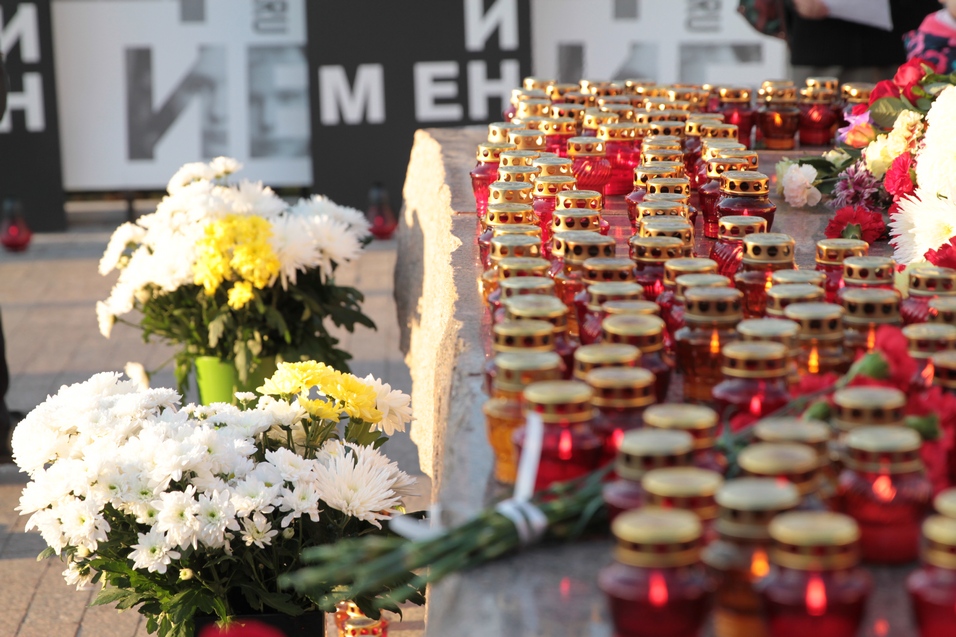
Memorial activists also met in St. Petersburg, where a Solovki Rock has also been brought to make a memorial to the victims of communism.
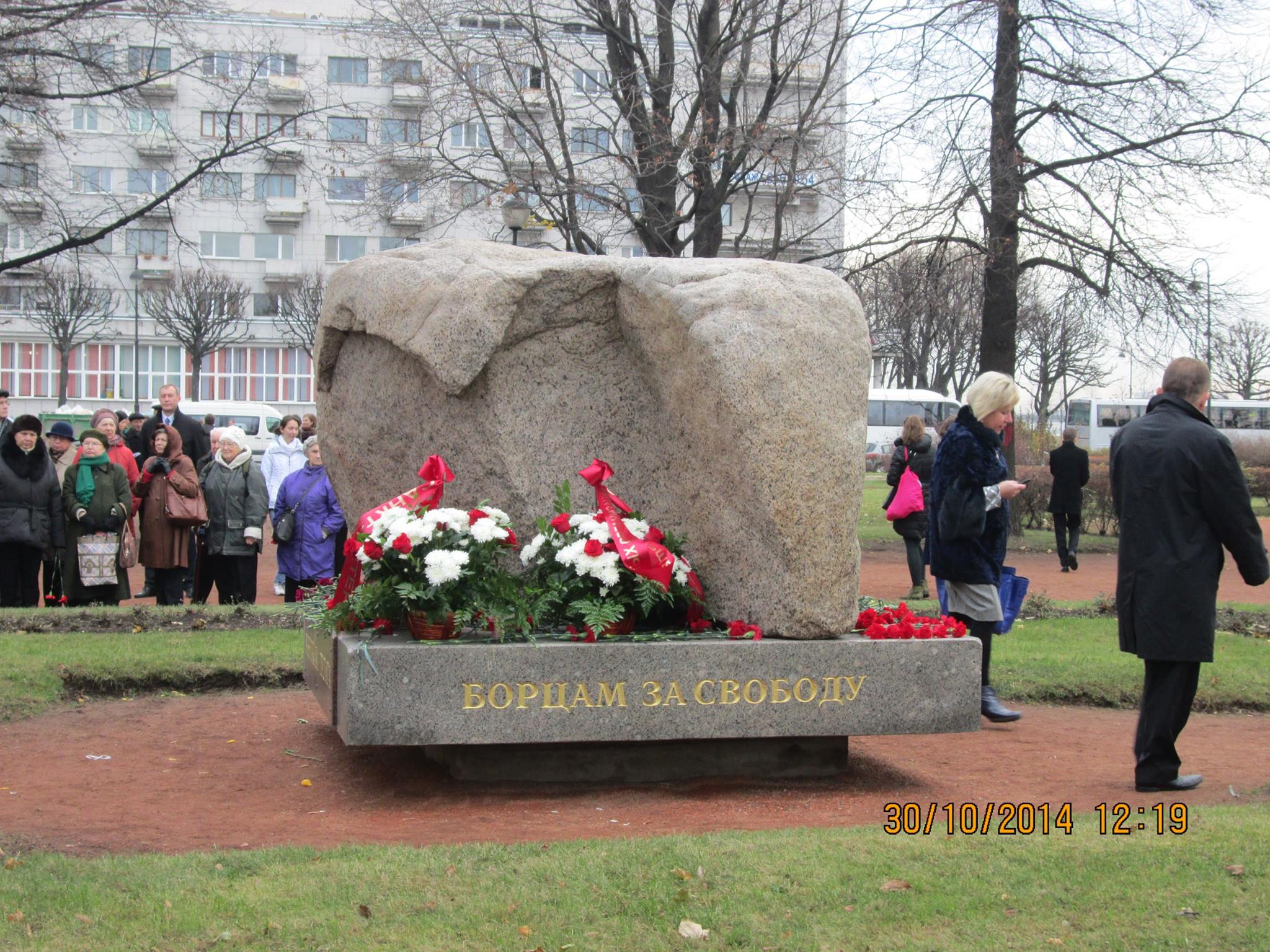 Inscription: “To the Fighters for Freedom”
Inscription: “To the Fighters for Freedom”
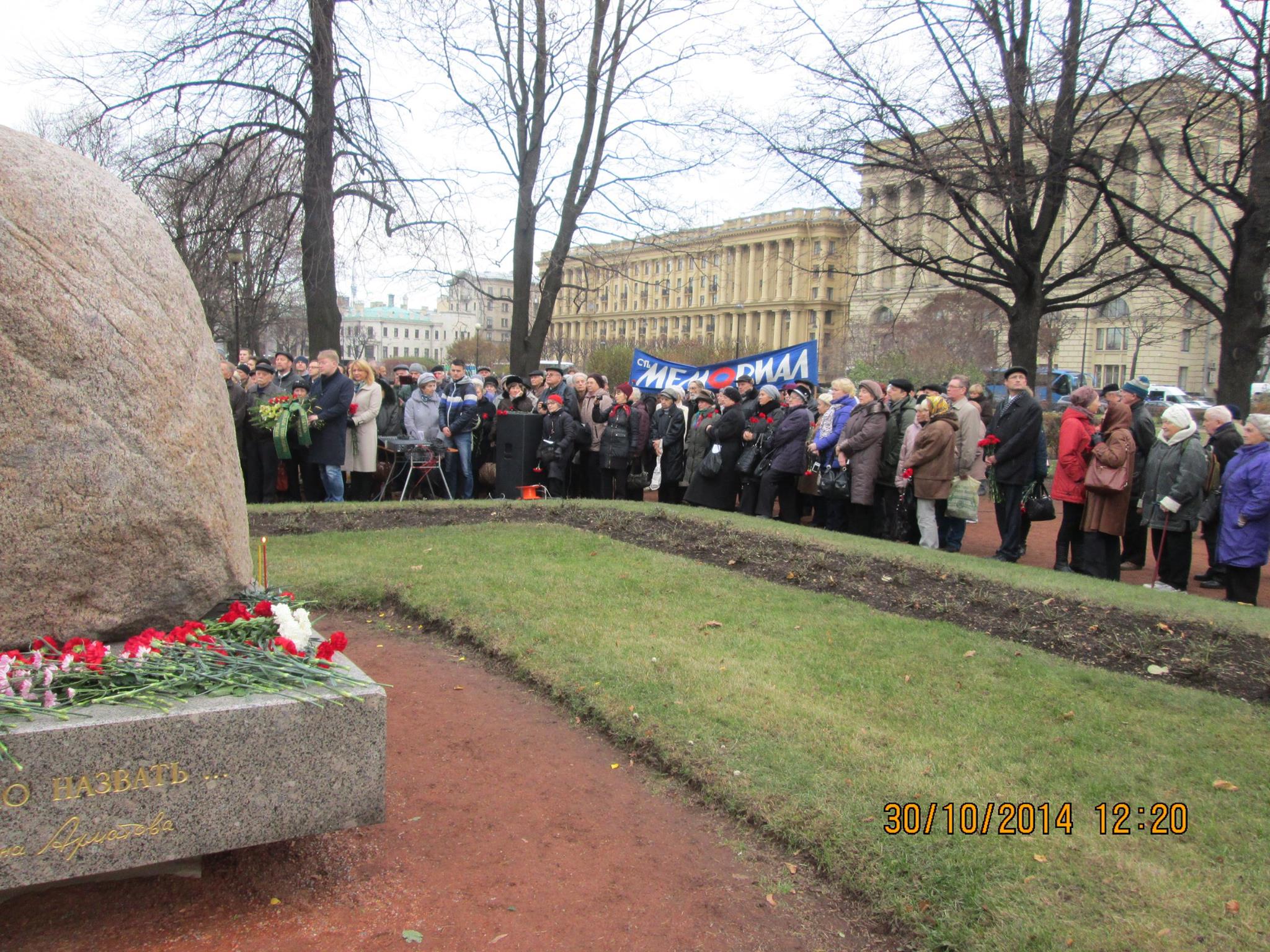
Photos by Irina Ronkina
Last week, the New York Post, ran a story by Richard Johnson revealing rumors that President Vladimir Putin has health problems.
“There is an explanation for Vladimir Putin’s hurry to invade Ukraine — it is rumored he has cancer,” said Johnson:
News outlets from Belarus to Poland have reported for months that the Russian strongman has cancer of the spinal cord. But my sources say it’s pancreatic cancer, one of the most lethal forms of the disease.
Putin is allegedly being treated by an elderly doctor from the old East Germany whom Putin met decades ago while serving in Dresden for the KGB. The doctor has been trying various treatments including steroid shots, which would explain Putin’s puffy appearance.
And here we thought the puffy appearance was about his reported Botox treatments.
Atlhough this story appeared on Friday, October 24, it has taken the Kremlin 5 days to respond. That’s odd, although because the Post is a tabloid, it may not have been taken seriously.
The government newspaper Vesti said today that Dmitry Peskov, Putin’s press secretary, has “refuted media reports about the supposed health problems of head of state Vladimir Putin.”
Asked by RIA Novosti, the state news agency which finally managed to put the question about the Post story, Peskov replied:
“They just can’t wait, curse that tongue of theirs! Everything’s normal.”
Peskov used a Russian idiom, tipun im na yazyk, which means “Let them get pip on their tongues” — pip being a kind of contagious bird disease.
No one has managed to interview the German doctor yet.
RBC.ru published an article yesterday October 28, reporting that for the first time in a year, the ratings of President Vladimir Putin have fallen.
In February, Putin unleashed an aggressive campaign against Ukraine, supporting pro-Russian separatists in Crimea, culminating in a forcible annexation of the peninsula. Then in April, he began sponsoring the pro-Russian separatist war in southeastern Ukraine, in which more than 3,000 civilians have already lost their lives.
While the West has imposed sanctions on the political and business figures closest to Putin in response, the Russian leader’s belligerent actions have only caused his popularity to soar at home.
But that’s changing now, seven months into the war, according to the Levada Center, a leading Russian pollster. If in August, when Russia launched an all-out invasion of Ukraine, 57% were prepared to vote for Putin, by September, only 49% of those polled would choose him. By then, the news of Russian soldiers killed in combat in Ukraine was already leaking out.
By contrast, in January 29% of respondents had indicated Putin was their desired president; by April, this was already a robust 49%.
If those who were uncertain or who did not intend to vote were removed from the results, the contrast would be even greater: 66% in January and 81% in April.
The number of those certain of their choice has also fallen; in August it was 66%; in September it was 59%, compared to 45% in January.
Aleksey Grazhdankin, deputy head of the Levada Center, says that a top rating can’t remain at its peak forever; if it continues for two periods of surveys in a row, then we can speak of persistent decline.
Moreover, August is a holiday month, when the non-Putin electorate, more wealthy citizens and residents of large cities may be away on vacation then, unlike supporters of the president, who were home to answer pollsters’ questions. By September, this situation evened out, he explained.
So far, other large public opinion polling services are not showing this decline, and Konstantin Kostin from the Fund for Development of Civil Society, an organization close to the Kremlin, believes that a one-time fall does not yet indicate a trend. If it keeps falling, and is confirmed by focus groups, it could be confirmed.
When a rating is more than 80% during a non-election season, that’s an excellent result, so if the rating stabilizes in the spring of 2014, that means there is no threat to the government, says Dmitry Orlov, member of the Supreme Council of United Russia.
“A small correction of a rating proves public opinion is growing more sane; an extreme rating after the onset of the Ukrainian crisis indicated that the public was in a tense state,” he says.
Compared to other political figures, Putin may have nothing to fear even with a further fall: Gennady Zyuganov, head of the Communist party was at 3% to 4% in August, even though he has continued to find more support (4% and 7%). The United Russia party itself has retained its peak rating of 42%, but if the number of those who are undecided is removed, it is 63% compared to the previous month of 62%.
The Moscow Times reports that two men have been sentenced for leading a group of mercenaries in Syria, a violation of a host of Russian and international laws.
A court in Moscow convicted two Russians of setting up an illegal mercenary squad, the first sentence in the country’s history to be handed down on those charges, Life News reported Tuesday.
Vadim Gusev and Pavel Sidorov were found guilty of deploying a 250-person unit in 2013 to fight in Syria’s civil conflict, the news website said.
Each faced up to eight years behind bars, but got away with three-year sentences at a closed trial. It was not immediately clear whether Gusev or Sidorov planned to appeal.
It was The Interpreter that broke the story in the English press nearly one year ago when we translated a story about a group of Russian mercenaries, calling themselves “The Slavonic Corps,” who were hired to go to Syria to defend oil fields for the Assad regime. In another Interpreter exclusive we translated an article that explained how the mercenaries suffered a heavy defeat during the course of their mission, and were forced to flee back to Russia.
As Izvestiya and 313news.net eported back in August, Gusev and Sidorov admitted their guilt while in pre-trial detention, and made a deal with the investigation. While they faced a maximum of 15 years under Art. 359 (mercenarism), after confession, they wound up with only 3 years.
Interestingly, the Duma is now looking at draft legislation, sponsored by Just Russia that would legalize such private military corporations. Earlier, when ultranationalist Vladimir Zhirinovsky’s Liberal Democratic Party of Russia (LDPR) tried to get such a bill passed in the Pskov Region legislature, it failed.
Pskov legislator Lev Shlosberg suffered an assault in August and continues to be harassed for his probe into a cover-up of the deaths in combat in Ukraine of military contractors from Pskov.
While the Russian March has been kept out of the center of Moscow for
their annual parade November 4, and Russian authorities have made some
symbolic moves to curb ultranationalist influence, Russian state media
has done nothing to turn down the volume
of anti-Kiev and Russian nationalist sentiment in broadcasting, despite
being urged to do so by the Presidential Human Rights Council’s chairman Mikhail Fedotov earlier this month.
Not only do reactionary figures like Vladimir Zhirinovsky
repeatedly appear on talk shows, nightly news continues to air a steady
stream of combat videos, glorifying the Russian-backed rebels from
“Novorossiya,” commanders nick-named “Givi” and “Motorola”
Russia’s Channel 1 has yet to retract a widely-denounced disinformation show, claiming that Ukrainian troops crucified a three-year-old boy based on false testimony from a militant’s wife in a refugee camp in Russia.
Russian opposition figures are routinely scapegoated as “fifth-columnists” and traitors, such as in this June broadcast aimed against the GULAG museum in the former Perm 36 Labor Camp. NTV claims liberal human rights activists from the local Memorial movement devoted to exposure of Stalin’s crimes were white-washing Ukrainian political prisoners who were supposedly “fascists.”
Realizing how much propagandistic state TV programs are re-posted on social media, which has been fueling hatred in society, Civic Action started a video and hashtag campaign recently to combat such xenophobia.
A dramatic social ad titled “Don’t Resurrect Fascism” shows a Russian family on the beach shying away from a group of Uzbek workers who sat down nearby, and making disparaging comments about them.
As the father in the Russian family spouts ethnic slurs, behind him a
decrepit hand emerges from the sand and soon the specter of a Nazi
storm-trooper is rising from the grave. He seems to recede as the wife
then counsels that the Uzbeks “should be allowed to work” in Russia, but then
rises again as she says the Central Asians should “live behind a wall
somewhere.” The video concludes urging Russians to “stay human” and “not
resurrect fascism.” Other pages on the site urge Russians to help refugees.
The video campaign has hashtags in Russian #фашдетектед
#нетфашизму that translates to “fascdetected” and “notofascism” and
is supported by the news sites Novaya Gazeta, grani.ru, Ekho Moskvy, TV Rain and Svobodnye Novosti, which have carried the ads.

“Fascism is resurrecting. But you can remain human. Learn about your chances. Pass the test.”
Over the weekend, as ultranationalists in fact were doing very poorly in Ukraine’s parliamentary elections, news circulated that the annual nationalist Russian March in Moscow, which also attracts extremists, anti-semites and xenophobes, was going to be cancelled by Russian authorities.
But the elation turned out to be short-lived — it isn’t being
cancelled completely, but is being allowed — outside of Moscow in
Lyublino, Yopolis reported, citing Interfax. In fact, that’s where it
has taken place in past years.
Last
week on October 23, Gazeta.ru reported that Moscow authorities had
turned down a request by nationalists for their march that included multiple suggestions
for routes, none of which were approved.
Originally the
nationalists had asked for the center of Moscow, but were rejected on
October 7, said Gazeta.ru.
The
organizers then re-submitted 10 more suggestions both outside of Moscow
in Lybublino but inserted Sakharov Avenue in Moscow again, saying they
expected 30,000 people.
Nationalists complained that a recent Peace March got to march through central
avenues and it wasn’t fair. “Moscow officials give this route for
various events of a liberal tilt. I hope that they will not refuse us,
either this year,” said Aleksandr Belov, one of the leaders of the
movement Russkiye [Russians].
Ultimately, the mayor’s office, which hands out the permits for demonstrations,
accepted a shorter route in Lyublino scheduled for November 4 to go
along Pereva Street between Maryino and Lyublino, and with up to 10,000
participants. Vladlen Kralin, who goes by the name Vladimir Tor, a
prominent nationalist, submitted the permit.
But Aleksey Mayorov, head of the
department for regional security and anti-corruption in the Mayor’s
office, said he saw no reason for moving the march from its traditional
location in Lyublino.

Dmitry Demushkin, another Russkiye leader said organizers had withdrawn
their applications for other venues and left in a request for a march in
Lyublino along the Moscow River embankment on Belorechenskaya Street.
This was reportedly approved, but organizers were trying to get a better
location.
Russian liberals and anti-war activists are
apprehensive about the march, which they think may attract more
extremists than ever this year, with President Vladimir Putin’s open
support for the “Novorossiya” concept, even if Moscow continues to feign
that it is not backing armed pro-Russian rebels in southeastern
Ukraine.
Last year a number of hateful and racist posters were visible in the parade.
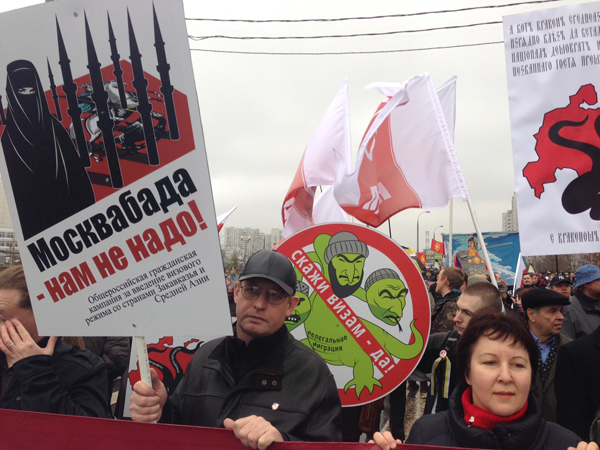
We don’t need Moscow-abad! All-Russian Civic Campaign for Visa Regime
with countries of Caucasus and Central Asia Say yes to visas!
While Muscovite leaders of the so-called “Donetsk People’s
Republic” like Col. Igor Strelkov and Aleksandr Boroday have been
withdrawn and replaced by those native to the Donbass, the Russian ultranationalists may seek an
outlet at home.
So far, the “Novorossiya” demonstrations in Moscow and a few other towns have
drawn very few people — rallies in the capital in recent months attracted 1,000 and
200, respectively, although tens of thousands of people avidly follow the
insurgents on social media and contribute funds to buy both
humanitarian and military goods.
By contrast, 26,000 people turned out in September in Moscow for a “Peace March” to protest the war against Ukraine.
Putin has moved to curb some of
the extremists, as recently Eurasianist ideologue Aleksandr Dugin was
dismissed from his post at Moscow State University and Yegor Prosvirin,
founder of the ultranationalist Sputnik & Pogrom website and supporter
of the separatists in Ukraine was placed under investigation for
“extremism.”
